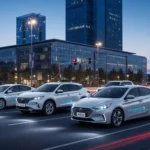Intelligent traffic lights have emerged as a transformative solution in our ongoing efforts to optimize traffic flow, reduce congestion, enhance road safety, and promote sustainable transportation. In a world facing urbanization challenges and increasing traffic demands, intelligent traffic lights represent a pivotal shift towards smarter and more efficient ways of managing our road networks. This comprehensive exploration delves into intelligent traffic lights, uncovering their significance, technological advancements, applications across various sectors, and their transformative potential for safer and more efficient transportation systems.
The Significance of Intelligent Traffic Lights
Intelligent traffic lights signify a fundamental change in managing and controlling traffic at intersections. As urban areas become more congested and traffic volumes continue to rise, these smart traffic management systems are crucial in reducing gridlock, enhancing road safety, and improving overall transportation efficiency.
Alleviating Traffic Congestion
One of the primary benefits of intelligent traffic lights is their ability to alleviate traffic congestion. These systems adjust signal timings to respond to changing traffic conditions through real-time data analysis and adaptive signal control. It reduces wait times at intersections, minimizes idling, and results in smoother traffic flow.
Enhancing Road Safety
Intelligent traffic lights are designed to prioritize safety. They can detect and respond to emergencies, such as approaching emergency vehicles, and provide extended green lights to ensure their passage. Additionally, pedestrian safety is improved through features like pedestrian countdown timers and automated pedestrian detection.
Environmental Benefits
Intelligent traffic lights contribute to environmental benefits by reducing congestion and minimizing idling. Reduced fuel consumption and emissions at intersections lead to improved air quality and lower greenhouse gas emissions, aligning with sustainability objectives.
Advanced Technologies in Intelligent Traffic Lights
Intelligent traffic lights rely on various advanced technologies and innovative practices to optimize traffic management and enhance safety.
Traffic Sensors
Traffic sensors collect real-time data on traffic conditions, including cameras, radar, and in-ground sensors. These sensors provide information on vehicle counts, speeds, and congestion levels, enabling the traffic light system to make data-driven decisions.
Adaptive Signal Control
Adaptive signal control systems use algorithms to analyze traffic data and adjust signal timings in real-time. These systems can prioritize high-traffic directions, reduce wait times during off-peak hours, and adapt to changing traffic patterns.
Connected Vehicle Technology
Connected vehicle technology allows vehicles to communicate with traffic lights and infrastructure. It enables features like vehicle-to-infrastructure (V2I) communication to inform drivers of upcoming signal changes and provide recommendations for safe and efficient driving.
Applications of Intelligent Traffic Lights
Intelligent traffic lights find applications across various sectors, benefiting from improved traffic management and safety.
Urban Transportation
Intelligent traffic lights are indispensable for managing complex intersections and reducing traffic congestion in densely populated urban areas. These areas often experience high traffic volumes, and traditional traffic management systems struggle to keep up. Smoother traffic flow facilitated by intelligent traffic lights benefits commuters, reduces commute times, and lowers fuel consumption. As cities continue to grow, the importance of these systems in ensuring efficient urban transportation cannot be overstated.
Public Transportation
Public transportation systems, including buses and light rail, greatly benefit from implementing intelligent traffic lights. These systems rely heavily on schedules and must maintain consistent travel times to provide reliable services. Intelligent traffic lights reduce delays and improve schedule adherence, making public transportation more attractive to riders. Efficient public transportation systems, in turn, encourage more people to choose these eco-friendly modes of transport over personal vehicles, further contributing to reduced congestion and emissions.
Emergency Services
Intelligent traffic lights have a crucial role to play in prioritizing emergency services. When emergency vehicles are responding to calls, every second counts. These systems can detect the approach of an emergency vehicle, prioritize its passage through an intersection by extending the green light, and safely clear the way. This capability can make a significant difference in critical situations, where swift response times are imperative for saving lives and minimizing property damage.
Pedestrian Safety
Pedestrians, often the most vulnerable road users, benefit significantly from intelligent traffic lights. These systems incorporate features such as pedestrian countdown timers and automated pedestrian detection. Pedestrian countdown timers provide a visible display, informing pedestrians how much time they have to cross the intersection safely. It reduces the risk of pedestrians attempting to cross when it’s unsafe. Automated pedestrian detection uses sensors to identify when pedestrians are present at crosswalks. The system can extend the pedestrian crossing time to ensure a safe passage when detected. These features enhance walkability in cities and reduce the risk of pedestrian accidents, contributing to safer urban environments.
Challenges and Ethical Considerations
While intelligent traffic lights hold immense promise, they also present challenges and ethical considerations that require careful attention.
Data Privacy and Security
Collecting and using real-time traffic data raises concerns about data privacy and security. Safeguarding sensitive information and ensuring that data is used solely for traffic management is essential. Ethical considerations include transparent data handling practices and protecting individuals’ privacy. In an era where data privacy is paramount, finding the right balance between improving traffic management and respecting privacy rights is a significant challenge.
Equitable Access
Ensuring equitable access to intelligent traffic lights is crucial from a practical and ethical standpoint. In urban settings, where these systems are often first implemented, it’s essential to prevent disparities between areas with and without intelligent traffic lights. Additionally, addressing the needs of underserved communities and economically disadvantaged regions is essential. Ethical considerations include ensuring that all communities, regardless of their socio-economic status or geographic location, have access to the benefits of these systems.
Environmental Impact
Balancing the need for improved traffic management with its environmental impact is an ongoing challenge. While intelligent traffic lights reduce emissions by optimizing traffic flow, manufacturing, installing, and maintaining these systems can have environmental consequences. Efforts should be made to optimize these systems’ environmental sustainability, considering the materials used, energy efficiency, and responsible disposal practices.
The Future of Intelligent Traffic Lights
Intelligent traffic lights are poised to assume an even more substantial role in shaping the future of transportation, fostering safety, sustainability, and innovation.
Autonomous Vehicles Integration
As autonomous vehicles become more prevalent, intelligent traffic lights will be crucial in coordinating their movements and ensuring safe interactions with human-driven vehicles. These systems must communicate effectively with autonomous vehicles to facilitate smooth traffic flow and maximize safety.
Smart Cities Integration
Intelligent traffic lights will be integrated into broader smart city initiatives, allowing seamless coordination between transportation, infrastructure, and data systems. This holistic approach will result in more efficient and sustainable urban environments. As cities evolve into smart cities, intelligent traffic lights will be a fundamental component of their transportation ecosystem.
Artificial Intelligence Advancements
Artificial intelligence (AI) advancements will enhance intelligent traffic lights’ capabilities. Machine learning algorithms will improve traffic prediction, congestion management, and adaptive signal control. These AI-driven systems will be capable of analyzing vast amounts of data in real-time, making them even more responsive and effective in managing traffic flow.
Conclusion
Intelligent traffic lights are not just a technological innovation but a fundamental shift toward safer, more efficient, and sustainable transportation systems. Their significance lies in their capacity to alleviate congestion, enhance road safety, and reduce environmental impact. As intelligent traffic lights continue to evolve, ethical considerations, data privacy, and equitable access must guide their development and deployment.
The future they envision is one where transportation is smoother, safer, and in harmony with sustainability principles. Intelligent traffic lights are the architects of a future where efficient traffic management leads us toward safer and more sustainable roads.





